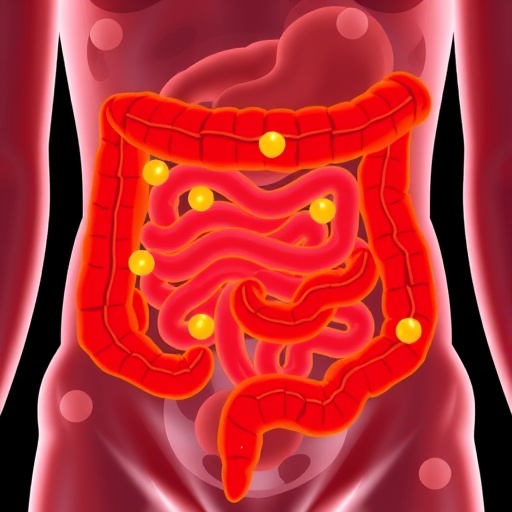Recent advances in medicinal chemistry have illuminated new pathways for therapeutic intervention in chronic inflammatory diseases, notably ulcerative colitis. A groundbreaking study conducted by Zhang, Ju, and Yang has introduced a novel class of compounds—triazole-linked (±)-agrimonolide derivatives. This research not only highlights the structural innovation of the compounds but also their profound implications in targeting key signaling pathways involved in ulcerative colitis, particularly the JAK1/STAT3 pathways.
Ulcerative colitis, a form of inflammatory bowel disease, has continued to challenge healthcare systems worldwide due to its chronic nature and the significant impact it has on patients’ quality of life. Existing therapeutic agents often provide limited effectiveness and can be accompanied by adverse side effects. The urgency for new treatments has spurred researchers to explore alternative compounds. The focus on (±)-agrimonolide derivatives is particularly noteworthy as they possess unique structural properties that may enhance their pharmacological profiles.
The study meticulously outlines the synthesis of these triazole-linked derivatives, drawing upon a combination of traditional organic synthesis techniques and innovative chemistry. The authors have employed a robust methodology that not only honors the complexities of the compounds but also ensures reproducibility in synthesis, a vital aspect when transitioning from laboratory bench to clinical application. Their approach underscores the significance of precision in drug development, particularly when dealing with complex molecular entities.
Through rigorous in vitro and in vivo testing, the pharmacodynamic profiles of these compounds were evaluated. The results indicated a significant reduction in colitis symptoms in treated subjects compared to those receiving standard care. This establishes a promising foothold for these derivatives in clinical settings. The scientists recorded remarkable improvements in mucosal healing, suggesting an innovative therapeutic strategy that may circumvent the limitations of current treatments.
A critical discussion point within the research is the mechanistic exploration of how these new derivatives affect the JAK1/STAT3 signaling pathways. The JAK-STAT pathway plays a pivotal role in mediating the inflammatory response, and its dysregulation is often implicated in chronic inflammatory diseases. By inhibiting this pathway, the triazole-linked (±)-agrimonolide derivatives can potentially mitigate the inflammatory cascade, leading to enhanced patient outcomes. This research aligns with the broader search for targeted therapies in conditions characterized by aberrant immune responses.
In addition to promising efficacy, another significant aspect of the study is the safety profile determined through preliminary toxicological assessments. Safety is a paramount concern in drug development, and the findings suggest that these new derivatives exhibit a favorable safety profile, an encouraging sign for future clinical trials. Understanding the toxicological impact of new compounds is critical, as it informs dosing strategies and long-term treatment paradigms.
The innovation behind this study not only lies in the synthesis and evaluation of new compounds but also in their potential scalability for production. The authors have discussed the synthetic route in sufficient detail, providing insights into how these derivatives can be produced at scale. This aspect is vital for translating laboratory success into clinical realities, as commercial viability plays a crucial role in the development of new therapies.
The implications of this research extend beyond ulcerative colitis, as the mechanisms explored may also apply to other inflammatory diseases. The versatility of the JAK-STAT pathway as a therapeutic target means that compounds developed in this context could find potential applications in various other conditions characterized by chronic inflammation and immune dysregulation. This reinforces the importance of continued research in this domain, fostering a pipeline of innovative therapeutics.
Furthermore, the study has sparked interest in the broader scientific community, leading to inquiries about the potential for collaborative research. The integration of interdisciplinary approaches in drug development is pivotal for harnessing comprehensive insights into complex biological systems. By fostering collaborations that encompass various scientific fields, the potential for breakthrough discoveries is significantly enhanced.
As this research continues to proliferate, attention will undoubtedly turn towards the next steps—clinical trial design and further mechanistic studies. The pathway to translating these findings into effective treatments necessitates a thorough understanding of pharmacokinetics and pharmacodynamics in human models. This underscores the critical need for sustained investment in translational research to bridge the gap between discovery and application.
The enthusiasm surrounding this groundbreaking study is palpable, with implications that resonate within both the scientific community and patient advocacy circles. Patients suffering from ulcerative colitis have long awaited innovative therapies that offer real hope and improvement to their lives. As compounds like the triazole-linked (±)-agrimonolide derivatives emerge from the lab, the prospect of a new generation of treatments offers renewed optimism for patients and their families.
In conclusion, the novel (±)-agrimonolide derivatives introduced by Zhang and colleagues represent a significant advancement in the fight against ulcerative colitis. The intricate balance of efficacy and safety found in these compounds signifies a meaningful evolution in therapeutic strategies. As research proceeds, the potential for this class of compounds could reshape the future of treatment for chronic inflammatory diseases, heralding a new era of targeted therapies that could alleviate suffering for countless individuals affected by ulcerative colitis.
In the ever-evolving landscape of biomedical research, studies like this remind us of the necessity for innovation and determination. Each discovery lays the foundation for future breakthroughs, and the commitment of researchers to uncover new solutions stands as a testament to the resilience of science in addressing some of humanity’s most pressing health challenges.
Subject of Research: 1,2,3-triazole-linked (±)-agrimonolide derivatives as anti-ulcerative colitis agents
Article Title: New 1,2,3-triazole-linked (±)-agrimonolide derivatives as anti-ulcerative colitis agents inhibiting JAK1/STAT3 pathways
Article References:
Zhang, X., Ju, MQ., Yang, HL. et al. New 1,2,3-triazole-linked (±)-agrimonolide derivatives as anti-ulcerative colitis agents inhibiting JAK1/STAT3 pathways.
Mol Divers (2025). https://doi.org/10.1007/s11030-025-11368-3
Image Credits: AI Generated
DOI: 10.1007/s11030-025-11368-3
Keywords: ulcerative colitis, agrimonolide derivatives, JAK1/STAT3 pathways, medicinal chemistry, chronic inflammation, therapeutic innovation.




